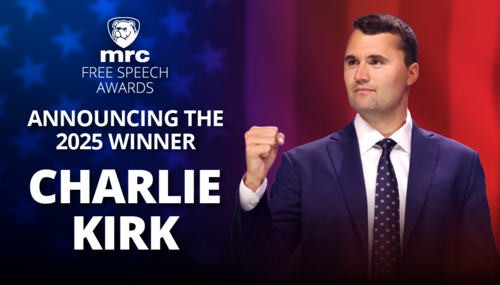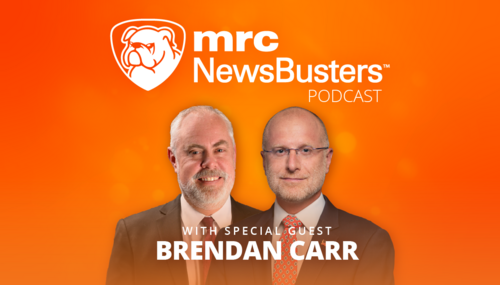 Citing a Thursday column from Baghdad by David Ignatius of the Washington Post, Fred Barnes, during the panel segment on FNC's Special Report with Brit Hume, scolded the news media for delivering a “daily diet” of news about explosions while missing progress on the political front. Ignatius began his column: “There has been so much bad news out of Iraq lately that you have to pinch yourself when good things seem to be happening. But there are unmistakable signs here this week that Iraq's political leaders are taking the first tentative steps toward forming a broad government of national unity that could reverse the country's downward slide.” He concluded: “Pessimism isn't necessarily the right bet for Iraq.”
Citing a Thursday column from Baghdad by David Ignatius of the Washington Post, Fred Barnes, during the panel segment on FNC's Special Report with Brit Hume, scolded the news media for delivering a “daily diet” of news about explosions while missing progress on the political front. Ignatius began his column: “There has been so much bad news out of Iraq lately that you have to pinch yourself when good things seem to be happening. But there are unmistakable signs here this week that Iraq's political leaders are taking the first tentative steps toward forming a broad government of national unity that could reverse the country's downward slide.” He concluded: “Pessimism isn't necessarily the right bet for Iraq.”Barnes, Executive Editor of the Weekly Standard, observed, “Here's what struck me about it: David Ignatius reported about a lot of top level private meetings of Sunnis, Shia and Kurds of the number of meetings over, what, the last couple of weeks, I think. Where were the reporters? Why did David Ignatius, a columnist for the Washington Post, have to go over there and reveal that to us? I mean, the reporters ought to know about that. These are major figures politically in Iraq and we get nothing from them except word of explosions. From the other reporters -- that's the daily diet." (More from Barnes, and an excerpt from the Ignatius column, follow.)
In the first segment of the March 16 panel segment on Special Report with Brit Hume, Morton Kondracke, of Roll Call, raised the column by Ignatius, who while not a wild liberal, is certainly no conservative:
“There was a really interesting story, column in the Washington Post today by David Ignatius who's sort of a centrist columnist. He's been, generally speaking, fair and he's in Baghdad and he interviewed a whole lot of people including our ambassador there, but also a number of Iraqis. And he is optimistic about the future there. He said that-”
Brit Hume: “You mean politically, the formation of a government?”
Kondracke: “Politically, the formation of a government, that the leadership in Iraq looked into the abyss of civil war and pulled back and is now working on a unity government. Now it's not formed yet, but if there's a hero here, boy it's Ambassador Khalilzad who's meeting with absolutely everybody to try to put this together and keep the country from flying apart. One thing that's interesting that was in there, is that Khalilzad sort of hints that we may have to go talk to the Iranians about, you know, what they're doing in Iraq and try to get them stop messing around, whereas this national security document declares that Iran is our foremost enemy in the world.”Fred Barnes: “This article was interesting for another thing that Mort didn't mention and, although I agree with everything you said about the article, and it is one that really is, I think creates some optimism and if you talk to people at the White House now they're predicting pretty strongly that a new government will be formed late this is month or early next month. To that I would say it's about time. But if it's formed that will be, that will I think solve some of the concerns that people have. Obviously, when they look at Iraq and they -- and they're not optimistic about what's going to happen there.
“Here's what struck me about it: David Ignatius reported about a lot of top level private meetings of Sunnis, Shia and Kurds of the number of meetings over, what, the last couple of weeks, I think. Where were the reporters? Why did David Ignatius, a columnist for the Washington Post, have to go over there and reveal that to us? I mean, the reporters ought to know about that. These are major figures politically in Iraq and we get nothing from them except word of explosions. From the other reporters -- that's the daily diet.”
An excerpt from the column by David Ignatius, “Steps Toward Unity in Iraq,” as published in the March 16 Washington Post:
BAGHDAD -- There has been so much bad news out of Iraq lately that you have to pinch yourself when good things seem to be happening. But there are unmistakable signs here this week that Iraq's political leaders are taking the first tentative steps toward forming a broad government of national unity that could reverse the country's downward slide.
What has brought Iraq's political factions together is the crisis that followed the Feb. 22 bombing of the Samarra mosque, which raised the danger that Iraq might tumble into a full-scale civil war. The country's political leaders seemed to realize, as they stood at the brink, that they would either come together or Iraq would fall apart. So far they seem to be choosing unity -- or at least serious talks about unity.
The venue has been a series of meetings this week that have included all of the country's major political factions. This conclave was proposed a week ago by U.S. Ambassador Zalmay Khalilzad. His idea was that the political leaders should all gather, in rural Iraq or perhaps at a Baghdad hotel, and keep meeting until they hammered out a new government....
Khalilzad told me in an interview in his office after Wednesday's session that the talks had produced tentative agreement on two basic points: First, the parties endorsed the idea of a unity government that would include all the major factions. Second, they agreed that this government should have a top-level "national security commission" that would include representatives of all the major political parties. Operating by consensus, this body would frame the broad outlines of policy, subject to the Iraqi constitution.
This week's dialogue broke the deadlock over the composition of the coalition....
The U.S. ambassador's upbeat account is believable because it is echoed by Iraqi political leaders. Adel Abdul Mahdi, Iraq's vice president and a representative of Hakim and his powerful Shiite party known as the Supreme Council for the Islamic Revolution in Iraq, told me Wednesday: "We have a common understanding on major issues -- on the need for consensus and on a national security commission. What makes me confident is that I think we are building up a sense of understanding among different communities." He said the message of the new government must be: "No one is outside of the law, whether the Badr Organization [the Supreme Council's militia], the Mahdi Army or the insurgency."
One seeming obstacle to unity has been fear about the role of Iran. To finesse that issue, Hakim said he is urging Iran to talk with the United States about Iraq's political future. Khalilzad himself has been quietly exploring what he calls the "modalities" for such U.S.-Iran talks on Iraq.
One hint of the new spirit of accord (and also of the political jockeying taking place) emerged when I visited Ahmed Chalabi, a Shiite politician who has allied himself over the past year with Sadr and with Prime Minister Ibrahim al-Jafari. With Chalabi Wednesday was Sheik Khalaf Elayan, one of the leaders of the biggest Sunni party. Chalabi seems to be seeking Sunni political allies, believing that they will be a crucial part of the next government. He also believes that Sunni tribal leaders such as Khalaf are working to stop the al-Qaeda leader Abu Musab al-Zarqawi....




